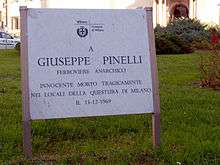Giuseppe Pinelli


Giuseppe "Pino" Pinelli (21 October 1928 – 15 December 1969[1]) was an Italian railroad worker and anarchist, who died while being detained by Italian police in 1969.[2] Pinelli was a member of the Milan-based Anarchist association named "Ponte della Ghisolfa". He was also the secretary of the Italian branch of the Anarchist Black Cross. His death, believed by many to have been caused by members of the police,[3] inspired Nobel Prize laureat Dario Fo to write his famous play titled Accidental Death of an Anarchist.[4]
Early life
Pinelli was born to Alfredo Pinelli and Rosa Malacarne.[1] His family was working-class in one of the poorest areas of post World War I Milan. Although he had to work many low income jobs, such as waiter and warehouseman,[1] in order to make ends meet, he nonetheless found the time to read many books and become politically active throughout his youth.[1] Among other political activities, he also worked with the anarchist group which published the weekly paper Il Libertario.[2]
In 1954 he found work as a railroad fitter. In 1955 he married Licia Rognini, whom he had met at an evening class of Esperanto.[2]
During the 1960s he continued anarchist activism. He organized young anarchists in the Gioventu Libertaria (Libertarian Youth) in 1962.[1] He helped found the "Sacco and Vanzetti anarchist association" in 1965. He founded the Ponte della Ghisolfa association (named after the nearby bridge) in 1968.[1]
Suspicious circumstances surrounding his death
On 12 December 1969 a bomb went off at the Piazza Fontana in Milan that killed 13 people and injured 88.[5] Pinelli was picked up, along with other anarchists, for questioning regarding the attack.[2] Just before midnight on 15 December 1969, Pinelli was seen to fall to his death from a fourth floor window of the Milan police station.[6] Three police officers interrogating Pinelli, including Commissioner Luigi Calabresi, were put under investigation in 1971 for his death, but legal proceedings concluded it was due to accidental causes.[7]
Pinelli's name has since been cleared,[6] and the far-right Ordine Nuovo was accused of the 1969 Piazza Fontana bombing[5] (in 2001, three neo-fascists were convicted,[8] a sentence overturned in March 2004;[5] a fourth defendant, Carlo Digilio, was a suspected CIA informant who became a witness for the state and received immunity from prosecution).[8]
Calabresi was later killed by two shots from a revolver outside his home in 1972.[9] In 1988, former Lotta Continua leader Adriano Sofri was arrested with Ovidio Bompressi and Giorgio Pietrostefani for Calabresi's murder.[10] The charges against them were based on testimony provided, 16 years later, by Leonardo Marino, an ex-militant who confessed to the murder of Calabresi, under order from Adriano Sofri. Claiming his innocence, Sofri was finally convicted after a highly contentious trial, in 1997.[11]
In popular culture
Pinelli's death is the inspiration for:
- Dario Fo's play Accidental Death of an Anarchist, although in the original script his name was not mentioned explicitly.[2]
- The painting "Funeral Of The Anarchist Pinelli" by Italian artist Enrico Baj.[2]
- The political documentary film 12 dicembre (1972) directed by Giovanni Bonfanti and based on an idea by Pier Paolo Pasolini.[12]
- The song "Ballata per l'Anarchico Pinelli".[13]
- The popular song "La ballata del Pinelli".[14]
- The movie Piazza Fontana: The Italian Conspiracy: Pinelli was portrayed by Pierfrancesco Favino.
Notes
- ^ Italian justice has used a system of [state witnesses] "collaboratori di giustizia-collaborators with justice" to fight against terrorism and the mafia.
See also
References
- 1 2 3 4 5 6 "Giuseppe 'Pino' Pinelli (1928-1969): the 17th victim of the Piazza Fontana bombing". Kate Sharpley Library.
- 1 2 3 4 5 6 "Pinelli, Giuseppe "Pino", 1928-1969". Libcom.org. November 9, 2006.
- ↑ "Italy from the 1960s". Encyclopædia Britannica. Retrieved 17 July 2011.
- ↑ Fleury, Matthew (1985). "Dario Fo". Bomb Magazine, New Art Publications. Retrieved 5 March 2013.
The events upon which the play is based took place in 1969. A bomb exploded in the center of Milan, near the Duomo. Sixteen died. The police blamed the anarchists, one of whom, Giovanni Pinelli, they seized. Later on he was thrown from a window at police headquarters. There is considerable evidence that Pinelli’s death was murder, not an accident as the police claimed, so the title Accidental Death of an Anarchist, is ironic. We are sure it was not an accident . . . . It was murder . . . . But this is the official police characterization of the event. The case was filed as an “accidental death.”
- 1 2 3 "1969: Deadly bomb blasts in Italy". BBC.
- 1 2 Bohlen, Celestine (26 September 1997). "Dispute in Italy Is Conjuring Up Its Terrorist Past". New York Times. p. 2. Retrieved 5 April 2009.
- ↑ "Né omicidio né suicidio: Pinelli cadde perché colto da malore". La Stampa. 29 October 1975.
- 1 2 "Three jailed for 1969 Milan bomb". The Guardian. July 1, 2001. Retrieved January 16, 2015.
- ↑ "Assassinato per strada il commissario Calabresi". La Stampa. 17 May 1972.
- ↑ Sasso, Cinzia (1 August 1988). "UN 'CASSIERE' RACCOGLIEVA ARMI E DENARO DELLE RAPINE". la Repubblica. Archived from the original on 17 January 2014. Retrieved 17 January 2014.
- ↑ Foschini, Paolo (23 January 1997). "Definitive le condanne per Sofri e gli altri". Corriere della Sera. Archived from the original on 17 January 2014. Retrieved 17 January 2014.
- ↑ "12 dicembre". IMDB.
- ↑ Nawrocki, Norman. Cazzarola!: Anarchy, Romani, Love, Italy (A Novel). PM Press. p. 172. ISBN 9781604863154.
- ↑ "La ballata del Pinelli". antiwar songs.
External links
- La ballata del Pinelli (The ballad of Pinelli) – in Italian
- 2001 Conviction of the bombers
- 13 December 2005 ANSA cable (in English)
- Giuseppe Pinelli Page Daily Bleed's Anarchist Encyclopedia